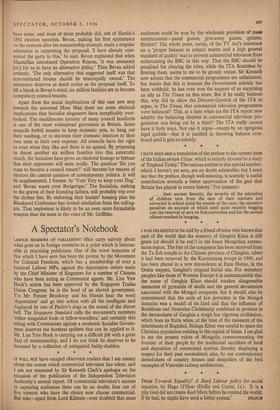IT WILL NOT have escaped observant readers that I am
uneasy about the course which commercial television has taken; and I am not reassured by Sir Kenneth Clark's apologia on the occasion of the publication of the Independent Television Authority's annual report. Of commercial television's success in capturing audiences there can be no doubt; four out of five viewers who have the choice now choose commercial. But who—apart from Lord Kilmuir—ever doubted that mass audiences could be won by the wholesale provision of masa entertainment—panel games, give-away games, quizzes. filmlets? The whole point, surely, of the TV Act's insistence on a 'proper balance in subject matter and a high general standard of quality' was to prevent commercial television from undercutting the BBC in this way. That the BBC should be penalised for obeying the rules, while the ITA flourishes by flouting them, seems to me to be grossly unjust. Sir Kenneth now admits that the commercial programmes are unbalanced, but insists that this is because the Government subsidy has been withheld; he has even won the support of so surprising an ally as The Times on this score. But if he really believes this, why did he allow the Director-General of the ITA to argue, in The Times, that commercial television programmes were balanced? This, at a time when (as the ITA report now admits) the balancing element in commercial television pro- grammes was being cut by a third? The ITA really cannot have it both ways. Nor can it argue—except by an egregious legal quibble—that it is justified in throwing balance over- board until it gets its subsidy.


















































 Previous page
Previous page